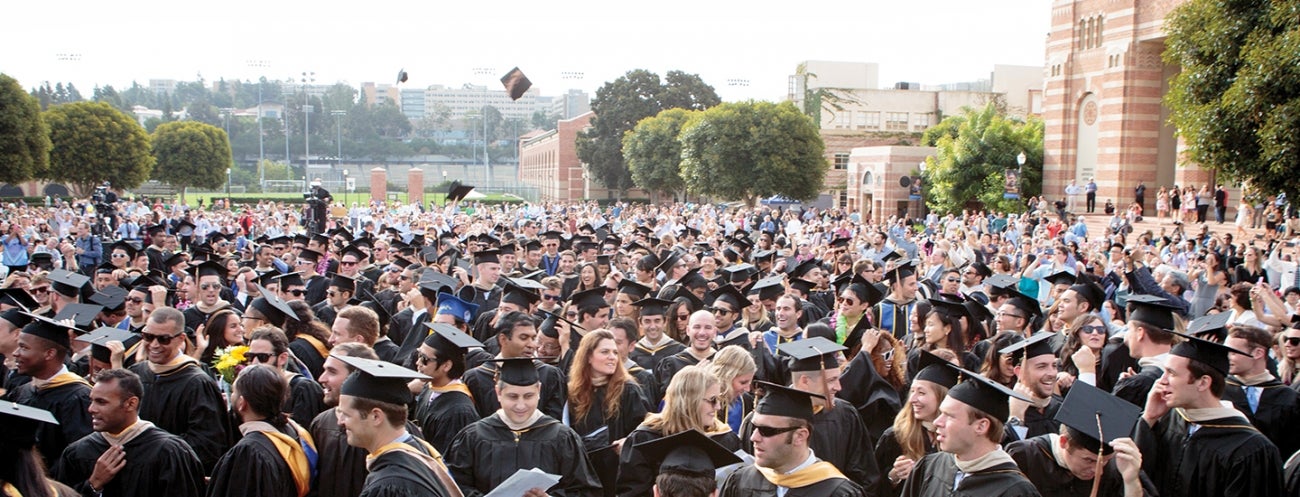Our Strategic Plan

Anderson 2021
Our Strategic Plan
Anderson 2021 is a roadmap for increasing the relevance and impact of UCLA Anderson’s research and graduates’ career preparation, for creating connections, identity and inclusivity as “One Anderson,” for partnering with the broader UCLA and alumni communities, for expanding our social mission and for generating new and sustainable revenue streams.
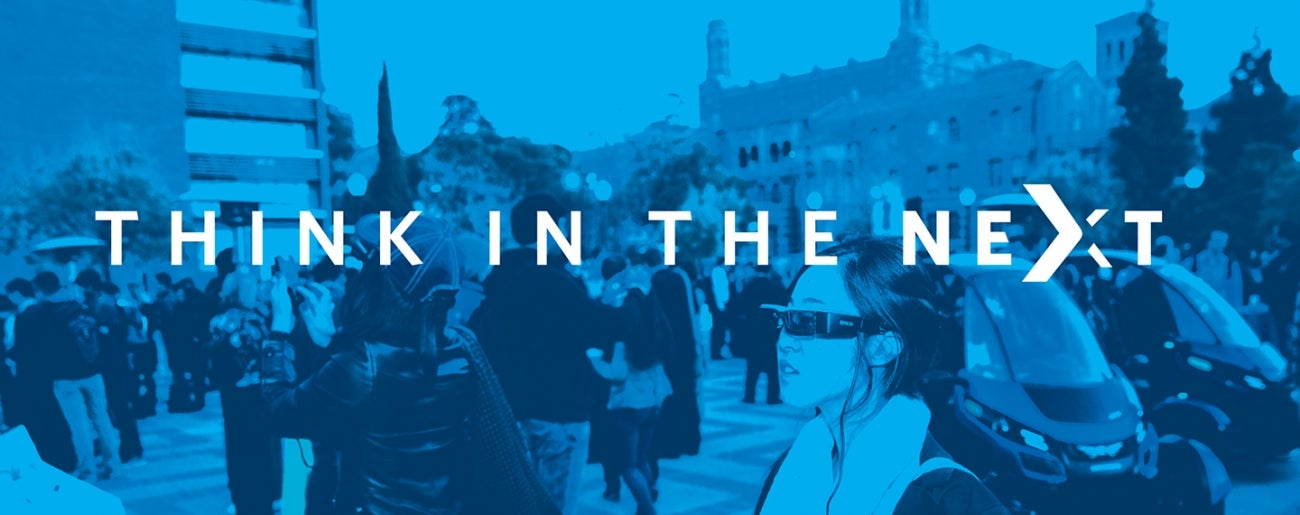
Mission and Purpose
Expanding beyond our initial focus on the Los Angeles region, our ambitions today extend to the world and embrace rigorous and impactful scholarship, principled leadership and entrepreneurial thinking.
As we Think in the Next and look to the coming five years, our starting point is pride in the scholarship of our faculty and our academic curriculum. Yet with the escalating pace of global change, UCLA Anderson must evolve to play a more significant role in shaping the future rather than reacting to what has passed.
We must continue to adapt and expand our learning and scholarly programs by fostering deeper knowledge — and real understanding — of the opportunities and challenges affecting business, society and our planet.
Over the next five years, we will:

Groundwork
The Context
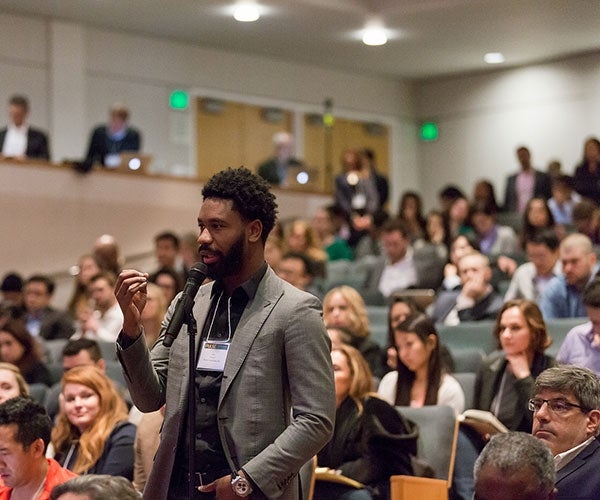
In a school of management, there must be an applied dimension to the thought leadership and educational programs we offer. These pursuits are meaningful only if they advance our understanding of drivers of behavior and value in organizations, markets and communities. Our strategic priorities for the next five years are shaped by continuing disruption in these drivers of value, and the urgent need for deeper understanding of the forces that shape organizations and markets. At UCLA Anderson, we are well positioned to advance management thinking in the midst of these complex shifts because of several unique advantages. These include:
- A superb faculty leading cutting-edge learning and research programs;
- A culture that shares success, thinks fearlessly and drives change;
- A leading, comprehensive public research university, UCLA, as our home;
- An essential grounding in Southern California, an innovation hub and a truly global region.

Strategic Goals
by strengthening the application and impact of Anderson’s research and teaching.
by developing internal coherence around UCLA Anderson's brand, strengthening connections among the school’s research areas, centers and learning programs.
DIVERSE AND INCLUSIVE
across Anderson’s faculty, staff, students and ideas.
more closely with the broader UCLA and alumni communities in degree and non-degree programs, entrepreneurial pursuits, social and networking activities.
new and growing sustainable revenue streams.
Enhancing our relevance
UCLA Anderson is renowned for the rigorous and inventive scholarship of its faculty. We are fiercely committed to research excellence. Increasingly, we recognize that our traditional disciplinary distinctions may no longer mirror market or organizational structures. Accordingly, we plan to establish structures and incentives to encourage interdisciplinary teaching and research to produce scholarship and learning programs that address evolving employer, market and societal imperatives.
This commitment necessitates openness to new forms of organization among our faculty, as well as reexamination — and, indeed, some reinvention — of our curricula and pedagogy in both degree and non-degree programs. Fundamental to this initiative is recognizing that the mix of faculty must accommodate those who excel at rigorous, inventive scholarship, as well as outstanding teachers who are leading innovators in their fields of practice.
We seek also to make important research more accessible to our students, alumni and business professionals. Given increasingly complex, sometimes opaque and radically changing business models and processes, it is essential that professionals benefit from more accessible research insights to obtain deeper understanding of the drivers and pitfalls of their fields.
These connections — across disciplines and among scholars, sophisticated professionals and students — will amplify the impact and influence of faculty research. They will bring enormous value to employers and our graduates because of the insights and practical applications they take away from the research.
Implementation:
To advance relevance and impact on the research front, we will invest in expertise that translates the research of our faculty into accessible narratives, e.g., applied research summaries, op-eds and webcasts. We have just formed a new interdisciplinary area in Behavioral Decision Making and will admit the first Ph.D. students into the program this year. We expect this and other new interdisciplinary connections that emerge over time to be responsive to market conditions, redeploy existing faculty, facilitate cross-disciplinary collaboration across academic areas and promote the hiring of faculty whose research interests are natural bridge builders across research areas.
On the teaching front, several initiatives will bring market-based expertise into the classroom and incentivize action learning. These include a teaching policy that encourages team teaching with executives, master classes with faculty who have been particularly innovative around action learning or partnerships with industry, and appointment of a Faculty Director of Teaching Innovations and Outreach. The new Faculty Director will also work to connect faculty to the marketplace, offer guidance in innovative pedagogy, create better systems for sharing good practices among our faculty and alternative methods of teaching review, link centers to each other and initiate innovative executive education programs. We will also reexamine the MBA curriculum to bring the most current market concepts and action learning approaches into the program, initiate classes shared across disciplines and attract faculty from industry who are the innovators in their fields.
Creating “One Anderson”
Successful brands faithfully reflect the character and performance of the service or product they represent. “Think in the Next” captures the excitement of innovation, opportunity and optimism, and the bold inventiveness of Southern California. Our pillars convey the character of our students and alumni who share success, think fearlessly and drive change. A brand must emerge organically and convincingly from the actions and narrative of our community. While many within the Anderson community “get” the brand, it is not yet a universal rallying cry.
As we build stronger connections within our community — among faculty areas and research centers, across programs and students — clear and coherent identity will emerge. Our unique character and distinctions will become obvious, generating stronger internal identification with the school’s brand and greater clarity for external constituents. These shared qualities will become points of pride within our community. And we must tell our stories externally, with enthusiasm, building the brand narrative with unique features of our programs and through the character and accomplishments of our faculty, students, staff and alumni.
Implementation:
Opportunities are immediately available to create connections across different Anderson communities, programs and research areas. For example, the impact of interdisciplinary teaching and research extends beyond increased relevance; these initiatives also create internal intellectual connections such as collaborations across centers, faculty appointments and areas of study, or development of multidiscipline tracks within the MBA program. It is important to connect the scholarly and student communities by investing in the translation of important research into more accessible narratives, and also by offering at least one course in which several faculty showcase their ongoing research projects to students.
Other channels for connecting across intellectual boundaries include development of cross-area case competitions or executive programs. The student communities must also be connected with each other through more frequent joint events. The new Marion Anderson Hall is designed to foster “One Anderson”; all MBA program offices will be housed in the new building.
There are also significant qualitative dimensions to creating One Anderson. The Anderson pillars — Share Success, Think Fearlessly and Drive Change — capture the essence of our student and alumni communities and form the glue that binds them. These pillars are imperatives that should guide amplified messaging around the brand. A parallel Anderson faculty credo is being developed to create shared values among the faculty, strengthening their sense of community. We need also to highlight the connections between the region’s distinctions — e.g., the intersection of technology and content, media and entertainment, business analytics — and existing parallels to the research and teaching expertise residing within our faculty.
Becoming more diverse and inclusive
At Anderson, our strong culture is defined as much by our differences as by our shared values. These differences — not only in demographics, but in background, experiences and world views — are sources of strength, creativity and, ultimately, success. We are committed to developing a deeper understanding of our differences in order to better accept, appreciate and empower them, and we pledge to celebrate a climate within which all members of the Anderson community feel welcomed, supported and valued.
Equity, diversity and inclusion is an essential ingredient of the learning environment we strive to foster: an environment that challenges our preconceptions and questions our biases through frank and brave discussions and that offers each member of our community an opportunity to grow and thrive.
Actions speak louder than words. We will demonstrate our commitment to equity and inclusiveness by embracing non-traditional forms of learning, inquiry and knowledge creation; by connecting with diverse segments of the broader community as an opportunity to learn, to serve and to advance equity, diversity and inclusion; and by expanding opportunities for access and supporting success among faculty, students and staff.
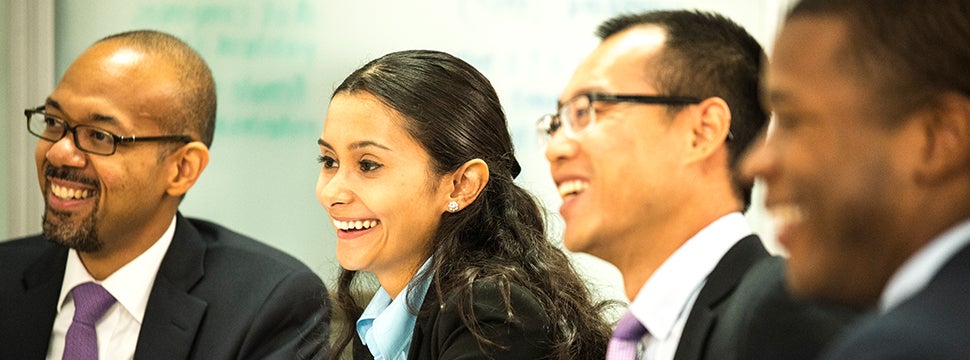
Implementation:
We have launched a series of candid and courageous discussions to challenge preconceptions about differences and inform new approaches to improving organizational equity, diversity and inclusion. At the same time, we will increase our engagement in community initiatives that advance equity, diversity and inclusion, continue to invest in programs that build a pipeline of underrepresented groups, and vigorously pursue every aspect of recruitment and advancement that may affect access, success or climate.
Partnering with the broader UCLA
and alumni communities
The benefits of location are derived as much from being part of our university as they are from our presence in Southern California. Revered globally, UCLA embodies world-class scholarship across a spectrum of disciplines, with outcomes that shape the future of our planet in ways large and small. It behooves us at Anderson to engage as much as we can with the rest of the university.
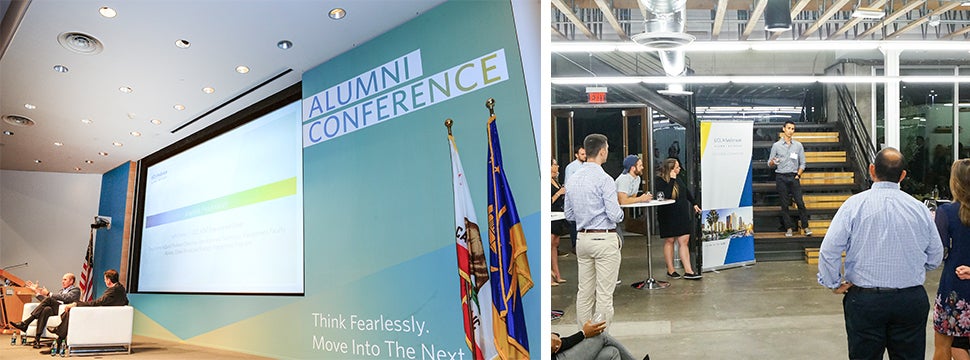
UCLA attracts more undergraduate applications than any university in the United States. Those who earn admission become outstanding students. Many, upon graduation, still hunger for skills that position them for business-related employment opportunities, building on the undergraduate majors they have already completed. We will explore the value of establishing a pre-experience master’s degree for UCLA undergraduate students seeking business-related opportunities. We will also strengthen faculty connections, collaborative programs and research center partnerships across the UCLA campus to enrich the relevance and impact of Anderson’s scholarship and degree programs, benefiting students and industry alike.
The 39,000 Anderson alumni represent a vast assortment of geographies and functional and industry pursuits, and are among the most successful members of their respective professions in many parts of the world. Our wish for all UCLA Anderson graduates is that they become “alumni for life,” Anderson ambassadors throughout the world, with lifelong connections to learning, the school, faculty, research centers and each other. We will develop new ways to engage and partner with our alumni as thought leaders and mentors, and to continue their own learning, career advancement and networking. We plan also to engage our alumni as important contributors to every facet of the student life cycle, from admissions to placement. As these connections deepen, we expect alumni pride and passion for the school to grow.
Implementation:
To better partner with UCLA, we will conduct a study to examine viability of a fifth-year undergraduate program that offers an M.S. in management for UCLA undergraduates. Other leverage points for further engagement with the university include alignment of our research centers with relevant units elsewhere on campus, and joint appointments of faculty.
To strengthen our connections with Anderson alumni, we will analyze their needs and offer richer opportunities for continuous learning. We will add programs to engage alumni as vital partners in every part of the student experience at Anderson — from recruitment to classroom involvement and student mentoring to placement and then reputation building. We must also respond to the varying needs of our alumni at different career phases, e.g., by engaging them in various research center programming, and launching a “reentry” program for alumnae who leave the workforce and later seek to return.
Elevating our social mission
Social engagement is fundamental to our mission as a public institution. As a school of management, we aim to elevate the social awareness of leading for-profit organizations, as well as the leadership and organizational capacity of nonprofits and civic organizations, with a multiplier effect that reverberates through communities. Social engagement is also increasingly valued and practiced by our students, staff, faculty and alumni. We intend to integrate research, education and service in ways that enhance scholarship and allow us to apply our knowledge to community problems and big issues, and positively impact society. Through research, curricula and field studies, we will explore and find solutions to important problems facing our society at local, national and global levels.
We have placed the many community-oriented initiatives at Anderson under one umbrella, Impact@Anderson. Creating this cohesion will broaden our reach in this area by supporting faculty research that advances social impact, by growing the number of purpose-driven field study projects and by expanding the school's engagement with community-building organizations.

Implementation:
To elevate Anderson's social mission, we will work on both the research and outreach fronts. We will seek funding to formalize a new Impact@Anderson center as a full-fledged research and social innovation center that enables expansion of its programming. We will also dedicate funding under this umbrella to faculty research that addresses the grand challenges of the day with the potential for broader impact. For students, we will seek to increase field study projects dedicated to social purposes. We will also facilitate community service projects among Anderson students, alumni, faculty and staff that build leadership capacity in communities locally, nationally and globally.
Generating revenue streams
Anderson’s master’s programs are self-supporting. We therefore exercise strong financial discipline to empower strategic priorities, along with entrepreneurial experimentation. We are ambitious in our aspirations, yet pragmatic in understanding the risks of potential disruption in market demand for various facets of management education. While we expect to be continually adaptive in programs or foci, we remain steadfastly committed to excellence in all we do. We have developed a portfolio of programs that balances risk and we will continue to refine that portfolio against strategic criteria and financial need. We are also very mindful of the need to protect the preeminence of the MBA degree program and the caliber of our scholarship.
Over the next five years we expect to expand current programs and launch new ones, subject to evolving market needs, Anderson’s distinctive expertise, strategic partnership and global considerations, and other stringent criteria we will impose before making such investments. Programs in various stages of development include a hybrid version of the Executive MBA degree — EMBA Access — the new Master of Science in Business Analytics launched in 2017, the dual degree UCLA-Peking University Master of Quantitative Finance and the pre-experience Master of Management. We expect to launch new non-degree programs aligned with evolving market demand and Anderson faculty expertise. We will also be disciplined in evaluating programs for discontinuation if they fail to meet quality, financial or market criteria.
As we build distinctive programs, expand our alumni engagement and strengthen the sense of pride in all that Anderson stands for, we also expect to grow philanthropy for our school. With increased disruption and competition from well-endowed competitors, the consistent support of our alumni and friends is especially vital. These supporters have been extremely generous to date. We are working hard to earn their continued confidence in our bright future.
Measuring Success
The strategic initiatives are designed to advance the school’s goals around relevance and impact, community identity and inclusivity, engagement with key stakeholders, and revenue growth. Success rests on progress in the following metrics:
- Application and placement trends in degree and non-degree programs, which are expected to rise with innovations in programs and learning approaches that capture evolving market and skill needs;
- Reputational measures (e.g., rankings, scholarly productivity, media mentions), as the school is increasingly recognized for the distinctiveness of its degree and non-degree programs, the influence of its research in organizational and market settings, and coherence around brand messaging;
- Diversity and climate trends, demonstrating progress in both quantitative and qualitative assessments in these areas among faculty, students and staff;
- Engagement measures with target constituencies demonstrating increased program involvement with the university, alumni participation rates (in giving, in events, in school-wide program initiatives, in continuous learning) and scale of community-based outreach projects;
- Financial health, reflecting a risk-balanced portfolio of programs and a sustained revenue stream (from programs and philanthropy) because of the success and excitement generated by the strategic initiatives.
